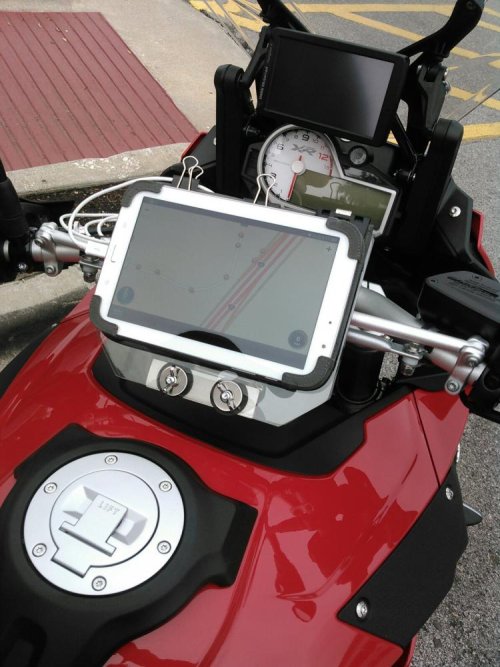ricochetrider
Out There Somewhere
Thought I'd post this here, not knowing if this is the correct or best space... Mods: if not, please move to the appropriate spot, and thanks!
Recently, at the Roadrunner Magazine Touring Weekend, I attended a SAT NAV seminar. The host was of the mind that GPS tech is on the way out, because
A: most of (or much of) the world is now using their smart phones, navigation & mapping apps, etc
B: the [U.S. based] satellites are old (but will be replaced in coming years)
This, of course is 100% arguable, but he was talking about using his phone and mentioned an app, CoPilot USA, within which he converted the provided compressed map files to routes.I was all ready to drop a few hundred dollars on a Garmin GPS, but now am downloading CoPilot USA maps (as we speak, actually). This app costs 9.99 (USD) and stores maps in your device. SO you'll need the space for them. Right now, I'm downloading North America- @ 2.34 gigs. Will also download Eastern USA, Southern USA, and possibly the straight-up USA map as well. These are 477.3 MB, 699.4 MB, & 2.14 GB, respectively.
Having recently gotten a new iPhone 6s, I have all this space, and more.
Not being one to just 100% believe in whatever anyone is selling, I am not ruling out a Garmin in the future, but will try to learn this app and all its ins n outs. Having the ability to convert files to routes etc is a bonus! I've heard repeatedly over the years how clunky and "peculiar" base camp is, so hopefully this will be a little easier to figure out and implement.
It is my own limited experience that tells me Garmin hasn't exactly kept pace with technology as it has leapt forward- case in point: Updates load on top of existing data, so too soon, you are out of space on the device. Garmin seems to be reluctant to really put any effort into making their system and devices more user friendly and modern. Just the same, of course a large percentage of people have used, and continue to use GPS navigation. Apparently, the EU and Russians have new satellite systems in place for navigation abroad, particularly Africa? If the USA is replacing their old satellites, then how is GPS tech a dying means of navigation?
Maybe some day in the future, Somebody will create a reasonably inexpensive GPS and a smarter, more user friendly system within with to operate.
Meanwhile....
anyone using CoPilot? Or other smart, intuitive apps on their smart phone?
Recently, at the Roadrunner Magazine Touring Weekend, I attended a SAT NAV seminar. The host was of the mind that GPS tech is on the way out, because
A: most of (or much of) the world is now using their smart phones, navigation & mapping apps, etc
B: the [U.S. based] satellites are old (but will be replaced in coming years)
This, of course is 100% arguable, but he was talking about using his phone and mentioned an app, CoPilot USA, within which he converted the provided compressed map files to routes.I was all ready to drop a few hundred dollars on a Garmin GPS, but now am downloading CoPilot USA maps (as we speak, actually). This app costs 9.99 (USD) and stores maps in your device. SO you'll need the space for them. Right now, I'm downloading North America- @ 2.34 gigs. Will also download Eastern USA, Southern USA, and possibly the straight-up USA map as well. These are 477.3 MB, 699.4 MB, & 2.14 GB, respectively.
Having recently gotten a new iPhone 6s, I have all this space, and more.
Not being one to just 100% believe in whatever anyone is selling, I am not ruling out a Garmin in the future, but will try to learn this app and all its ins n outs. Having the ability to convert files to routes etc is a bonus! I've heard repeatedly over the years how clunky and "peculiar" base camp is, so hopefully this will be a little easier to figure out and implement.
It is my own limited experience that tells me Garmin hasn't exactly kept pace with technology as it has leapt forward- case in point: Updates load on top of existing data, so too soon, you are out of space on the device. Garmin seems to be reluctant to really put any effort into making their system and devices more user friendly and modern. Just the same, of course a large percentage of people have used, and continue to use GPS navigation. Apparently, the EU and Russians have new satellite systems in place for navigation abroad, particularly Africa? If the USA is replacing their old satellites, then how is GPS tech a dying means of navigation?
Maybe some day in the future, Somebody will create a reasonably inexpensive GPS and a smarter, more user friendly system within with to operate.
Meanwhile....
anyone using CoPilot? Or other smart, intuitive apps on their smart phone?








